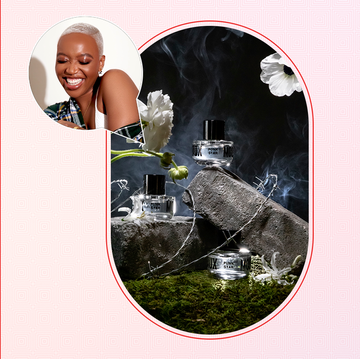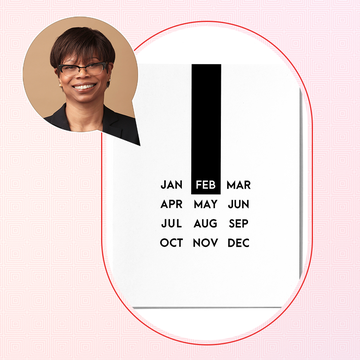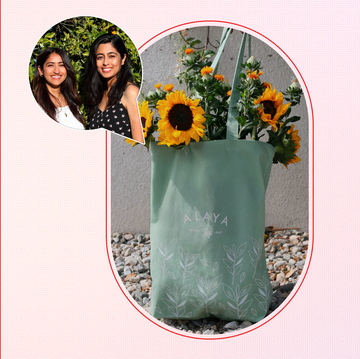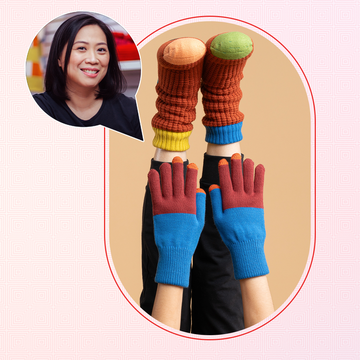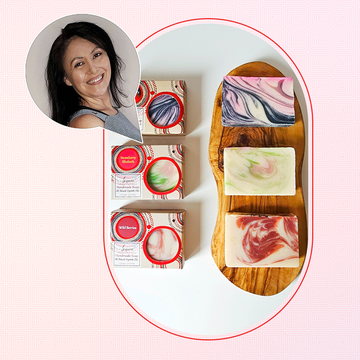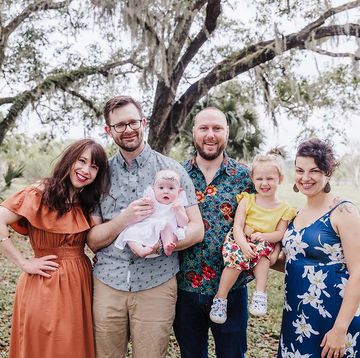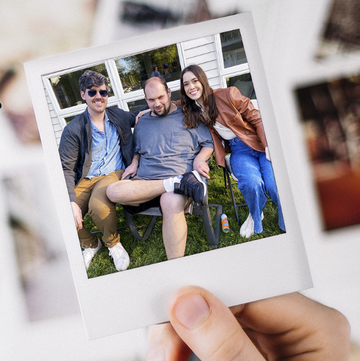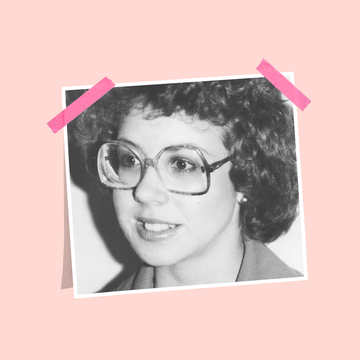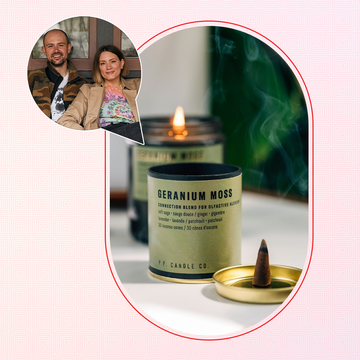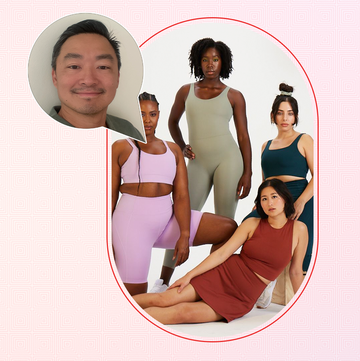She may be showbiz royalty — a Grammy-winning hip-hop artist with a Golden Globe, an Oscar nomination, a star on the Hollywood Walk of Fame, and a hit daytime TV talk show plus her own cosmetics line for CoverGirl and clothing collection for HSN — but a princess she's not: On set for the GH cover shoot, Queen Latifah walks over and sweetly, almost shyly, introduces herself, saying, "Hi, I'm Dana."
Dana?!
Yes, Dana — there's no playing the royal card here. Queen Latifah, 43, was born Dana Elaine Owens, the daughter of high school teacher Rita Owens and police officer Lancelot (Lance) Owens. She grew up in and around Newark, NJ, loving sports and rock 'n' roll. She became a rap star as a teenager, using the nickname Latifah (which means "delicate and kind" and was given to her by a Muslim cousin).
But for millions of music, movie, and TV fans, Dana's persona is the Queen — a smart and sassy yet sensitive performer and businesswoman, brimming with charisma and self-acceptance.
Though her success story may read like a fairy tale, she has seen more than her share of trauma, tragedy, and self-destructive behavior en route to today's happy ending. By drawing on her enduring faith, Latifah has embraced a determinedly upbeat outlook.
"There's probably no reason I should be here as an African-American girl from Newark," Latifah says. "And for a lot of the things I've wanted to do in life, I haven't looked typical," she adds, referring to Hollywood's beauty standards. While other aspiring actresses might have compromised themselves to win a role, Latifah has famously declared, "I was not born a size 2. I'm not skinny, period. I'm not willing to sleep with the director or step on somebody else's neck to get the job."
RELATED: Queen Latifah's Healthy Habits (and Guilty Treats!)
Instead, she has used her head and her heart to get ahead, "accentuating the positive and eliminating as much negative as possible." That was not always easy, she confides: "I think I got to that place by not being happy with the other side — hating your body and criticizing yourself all the time. When I was around 18, I looked in the mirror and said, You're either going to love yourself or hate yourself. And I decided to love myself. That changed a lot of things."
In addition to self-acceptance, family has always been an anchor for Latifah. Growing up, her best friend was her brother, Lance Jr., two years her senior. They were raised by hardworking parents with musical talent — they had first met as singers on an Army base — who instilled the value of education and discipline. "My mom has always been my champion," Latifah says. "She was very smart and grounded. She said, 'Save your money. Pay your taxes. Don't put everything in one basket,' but she let me explore and be creative." (Latifah is now returning the favor; her mother, who has had some health issues recently, lives in Beverly Hills with her famous daughter, who enjoys cooking healthy meals for her after a busy workday.)
There were struggles. Latifah's parents split when she was young, and for nearly a year, when Latifah was 8, Rita Owens raised the kids in a public housing project. "It became my goal to buy my parents houses," Latifah says of those days, "and I did." Puberty was also a challenge. "Growing boobs at, like, 11 years old, you get teased," she says. (Latifah had breast-reduction surgery a decade ago to alleviate back and shoulder pain.)
Surprisingly, her interest in hip-hop — then very much a male-dominated industry — led to skyrocketing success. At 18, she released her first single. Yes, she splurged on some bling with the proceeds, but she soon found better investments, including real estate and her own ventures. By 21, she'd made her acting debut in film (Jungle Fever) and on TV (The Fresh Prince of Bel-Air).
But barely a year later, when she was soaring professionally, her personal world fell to pieces. Her brother, a police officer, was killed in an off-duty crash. Heightening the pain: When it happened, he was riding the motorcycle Latifah had bought for him just two months earlier. Trying to keep the memory of him alive, she retrieved the key to the bike he had been riding, had it dipped in gold, and wore it on a chain around her neck for years. (She now keeps it in a safe.) And while others might have sworn off motorcycles in such a situation, Latifah was back on hers about a month later. "Riding was one of the things Lance and I did together a lot," she explains. "I had to get back on. It was like a [healing] potion."
But her heart was broken and her spirit shattered: "My life was rocked to the core." Especially her faith. Raised a churchgoing Baptist, she wondered how God could have done this. "And I felt guilty," she adds, "because I was angry at God." Latifah threw herself into work as a refuge and had even greater success, which proved bittersweet. "Lance was not there for me to share it with," she says. "And I was thinking, Well, I don't need this. I'd rather have my brother back."
In 1995, Latifah experienced another devastating blow: She was a victim of a carjacking in which her passenger, a dear friend, was shot and nearly died in her arms. It began to seem that professional triumph came with a price: personal devastation.
She turned to self-medication: "Drinking a bunch of alcohol, numbing myself. Every day I would be faded, like a painting that's just not vibrant, whose edges are dull," she says somberly. "I wasn't living my full life." Indeed, in early 1996 she was arrested while driving with a small amount of marijuana and also a loaded handgun, which she had carried since the carjacking.
Latifah knew it was time to stop the downward spiral. Jada Pinkett Smith, her friend and Set It Off costar, recommended a therapist to help her process the grief. And there was more to her sorrow than the death of Lance. She dug deep and confronted the fact that, as a child, she had been molested by a babysitter — a secret she'd kept buried for years. "We ignore our feelings a lot, I realize," she says. "Many of us have to…until they really bite us in the butt." Therapy helped her realize that, contrary to her feelings, the abuse had not been her fault. "What set me free was looking at it from a different perspective," she says. "I was 5, manipulated and afraid." Today, she encourages anyone who has been through or suspects abuse to speak up: "You have to say something. The power of those who perpetrate the abuse is your fear and your shame…and that's unacceptable."
Just admitting her pain, though, didn't make it evaporate. Over time, Latifah learned to accept what had happened and studied ways to move forward. A voracious reader, she sought solace in books, consulting Elisabeth Kübler-Ross's On Death and Dying, about the five stages of grief, and the Dalai Lama's The Art of Happiness. In the hopes of helping others, she has also shared empowering messages in books like Ladies First: Revelations of a Strong Woman and Put on Your Crown: Life-Changing Moments on the Path to Queendom.
Faith First
The support of her friends and family helped Latifah through her sadness, but the real key, she says, was her faith in God, whom she believes to be ever-present in her life, no matter what setbacks she faces.
"I was continuously praying," she says. Ultimately, she let go of the anger: "I realized that wasn't helping me or my brother. I learned that God was going to provide comfort; I know He is always listening and guiding."
Latifah spoke to her departed brother and asked God for signs. She is convinced she received answers, which gave her hope: "I got this little message in my head that I feel was from God. It was as clear as day, like a voice that said to me, Dana, don't let it all go, because you're gonna get through this." It made her realize something: "Nobody is perfect," she says resolutely. "I know that I'm not a saint, but God's love is there for me. I know that I need help to make it through every day, so I pray to God to help me do the best I can, to lift me up when I am tired and help me develop into the person He wants me to be…I am always surrounded by His love, and He is always there."
Royal Wisdom
Latifah's new talk show is a reflection of that positive outlook. It's a winning mix of celebrity interviews, inspirational stories, giving back, and just plain fun — with Latifah clearly having a great time. It's part of her new lighter, brighter vibe.
"The world is going to keep turning whether I'm here or not," Latifah says. "Taking the worry of the world on my shoulders is not right. My New Year's resolution is to stay humble and be joyous, whether that's spending time with family, hiking, driving around, listening to music, or playing with my dog. It's so important to take care of ourselves that way." The Queen has spoken — and very wisely indeed.




